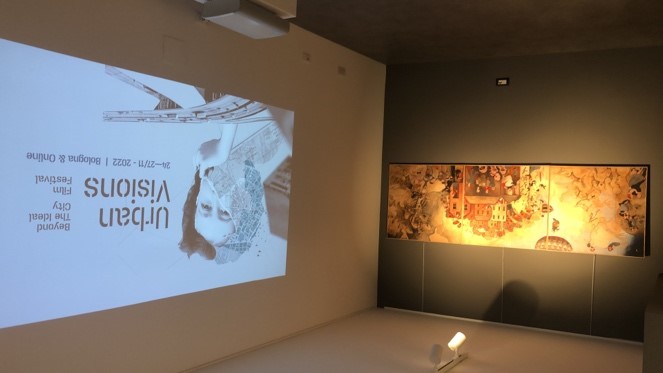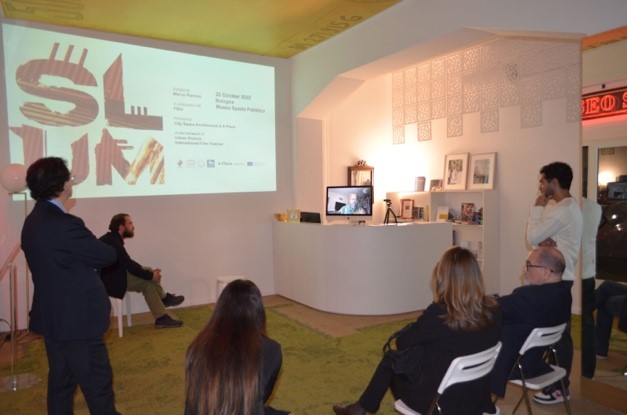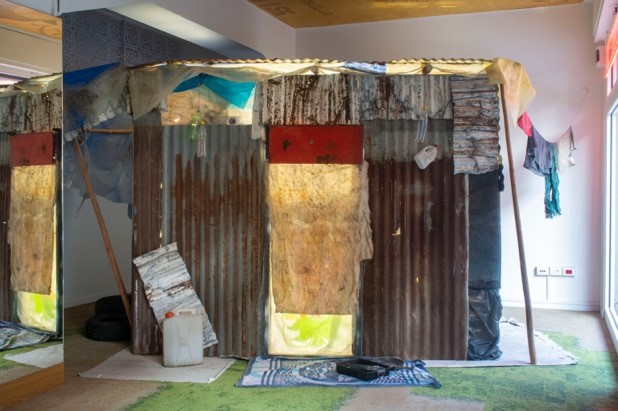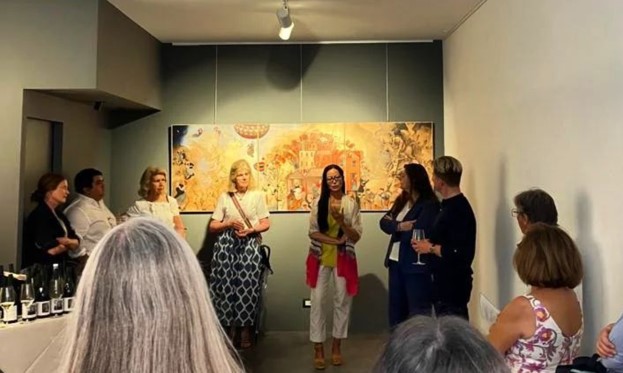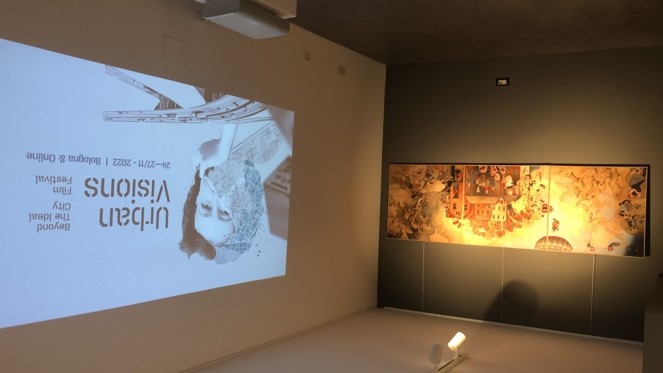Dissemination activities
Festival Event
When
From 22 October 2022 to 19 September 2023
Where
on-line
Posted
13 December 2023
Category
Screening
In 2022 and 2023, City Space Architecture organized several dissemination activities around the Urban Visions Film Festival, with the intention to promote contents collected in the three previous editions, selected from a catalogue of around 110 short films from the A-Place sections.
A-Place programme
The dissemination activities of the Urban Visions Film festival was an opportunity to screen and present audio-visual contents, but also to promote the festival and the A-Place project. These activities took place:
- at City Space Architecture’s headquarters, Museo Spazio Pubblico [Public Space Museum], with the exhibition SLUM, hosting the short film “L’asino che vola (The Flying Donkey)” by Marco Piantoni, that was awarded with a special mention in the category “Migrants, refugees and displaced communities”
- at the Fondazione Marta Czok in Venice, a selection of short films included in the exhibition “The rise and fall of the ideal city”, curated by Jacek Ludwig Scaro, Anna Marazuela Kim and Luisa Bravo.
Further dissemination activities included an exchange with the Pame Kaimakli Festival in Nicosia, at the pop-up cinema.
SLUM: exhibition of the short film “L’asino che vola (The Flying Donkey)” by Marco Piantoni
In October 2022, City Space Architecture’s headquarters Museo Spazio Pubblico hosted the exhibition SLUM with an installation conceived by Marco Piantoni and inspired by his documentary film “L’asino che vola (The Flying Donkey)” produced by the Italian Human Rights Federation, which deals with the problem of slavery in Mauritania through the story of the political/anti-slavery leader Biram Dah Abeid and his peaceful movement IRA Mauritania. The short film was awarded with a special mention at the second edition (2021) of the festival, in the category “Migrants, refugees and displaced communities”.
The film narrates the long-standing struggle of Biram, who has been fighting for years to eradicate the scourge of slavery in his country. His fervent desire is to liberate those still subjected to the inhumane practice that forces children, women and men to work without freedom, compensation, or education. While Mauritania officially abolished slavery in 1981, this achievement remains largely symbolic. In reality, the government failed to provide the necessary economic, social, and political resources for true emancipation of the formerly enslaved. Consequently, in addition to the despicable practices directly linked to slavery, many individuals endure harsh social and economic conditions that deprive them of even the most basic elements of freedom.
During the film production in Mauritania, one striking aspect that deeply affected Marco Piantoni was the living conditions of people. The dilapidated shacks, lacking electricity and drinking water, exhibited hygienic and living conditions well below decency. Despite this, many people lived inside, especially children, full of vitality, dreams and hopes. This stark contrast became the inspiration for the installation “SLUM” at Museo Spazio Pubblico. The objective was to transpose or reproduce one of the shacks from Mauritania to Bologna, aiming to emphasize the presence of vital energy and imagination in a where it is difficult to feel free free to act in accordance with one’s wishes.
At the opening on 22 October 2022, filmmaker Marco Piantoni introduced the installation “SLUM” along with his documentary film with Antonio Stango, President of the Italian Human Rights Federation, and Eleonora Mongelli, Vice President of the Italian Human Rights Federation. The event also featured online participation from Vincent Kitio, Chief of Energy Unit at UN-Habitat, the United Nations Human Settlements Programme. The recording of the event (in Italian) can be seen on Youtube.
Urban Visions in dialogue with the art work of Marta Czok
On the occasion of the opening of their project space in Venice in June 2023, Fondazione Marta Czok presented a selection of works from its collection. These works engaged in dialogue with video artists and filmmakers from around the world, as part of a special collaboration with Urban Visions film festival. Curated by Jacek Ludwig Scarso with Anna Marazuela Kim and Luisa Bravo, this first exhibition was entitled “The Rise and Fall of the Ideal City”. The exhibition, presented in partnership with the World Art Foundation and London Metropolitan University, coincided with the 18th International architecture exhibition at the Venice Biennale.
The Urban Visions film festival showcased a compilation of content from various short films featured in its third edition (2022). These selections were played in a loop, providing the audience with an overview of the festival's offerings.
The exhibition officially opened to the public on June 24, 2023, accompanied by an introduction from the curators. It garnered attention from the national press dedicated to art and culture, in particular on Exibart and Artribune.
Marta Czok's paintings, spanning from the early eighties to the last decade, offer a satirical perspective on social hierarchies within the city. These works portray the powerful, who perceive themselves as unstoppable, yet the world they seek to dominate is nothing more than an ideological construction: everything is contingent, transitory, and subject to upheaval. On the opposite end of the social spectrum, ordinary citizens seem powerless, but it is through their labour that a city’s wealth is constructed, and social change made possible. In conjunction with these works. These films explore the city in relation to the contexts of migration, social injustices, and resilient communities. Through this dialogue, “The Rise and Fall of the Ideal City” aimed to be a stimulus for critical reflection on the urban context. It also aimed to inspire consideration of how artistic languages across various disciplines can bring forth bring new ideas and crucial testimonies in response to contemporary urban challenges.
British of Polish origins, Marta Czok was born in Beirut (Lebanon) in 1947. In a career spanning over 40 years, her works have been shown in Europe and the United States also as part of the “Alitalia per l’Arte” project. In 2000 Alitalia commissioned a triptych by Czok, donated to Pope John Paul II for his 80th birthday. The same year, the French Embassy to the Holy See invited her to paint a work on the theme of the Jubilee. In collaboration with Albemarle Gallery, London Mayfair, the Royal Caribbean also commissioned a painting by Czok for their ship Navigator of the Seas. In 2008 the Polish national television has dedicated a documentary to Marta Czok focusing on the relationship between her work and the Second World War. Marta Czok has worked on several touring shows, including the one dedicated to Children of War and of the Shoah at Palazzo Ferrajoli (Rome), Museo Civico di Albano and Palazzo Antico Ghetto (Padua) and About Us, an exhibition on the theme of humanity, at Palazzo dei Papi (Viterbo), Palazzo Zuckermann (Padua) and Palazzo Zenobio (Venice). In Poland, since 2020, the show To Nazywasz Sztuka? has toured first in Warsaw at the Museum of Caricature, and then in Lublin at the Centrum Spotkania Kultur, with future destinations to be announced.
Other files:
Links
Contact
Film Festival Urban Visions / City Space Architecture
urbanvisions@cityspacearchitecture.org
Participants
Young and experienced film-makers, public space activists, placemakers, artists and city designers.
Cinema enthusiasts, film studies scholars and non-expert urban users.

